- Home
- Lauren Weisberger
The Devil Wears Prada Page 4
The Devil Wears Prada Read online
Page 4
“Um, well, I don’t think I can do this Monday because I don’t currently live in New York,” I quickly explained, clutching the phone, “and I’ll need a couple days to find an apartment and buy some furniture and move.”
“Oh, well, then. I suppose Wednesday would be OK,” she sniffed.
After a few more minutes of haggling, we finally settled on November 17, a week from Monday. That left me a little more than eight days to find and furnish a home in one of the craziest real estate markets in the world.
I hung up and flopped back down on the couch. My hands were trembling, and I let the phone drop to the floor. A week. I had a week to start working at the job I’d just accepted as Miranda Priestly’s assistant. But, wait! That’s what was bothering me . . . I hadn’t actually accepted the job because it hadn’t even been officially offered. Sharon hadn’t even had to utter the words “We’d like to make you an offer,” since she took it for granted that anyone with some semblance of intelligence would obviously just accept. No one had so much as mentioned the word “salary.” I almost laughed out loud. Was this some sort of war tactic they’d perfected? Wait until the victim was finally deep into REM sleep after an extremely stressful day and then throw some life-altering news at her? Or had she just assumed that it would be wasted time and breath to do something as mundane as make a job offer and wait for acceptance, considering that this was Runway magazine? Sharon had just assumed that of course I’d jump all over the chance, that I’d be thrilled with the opportunity. And, as they always were at Elias-Clark, she was right. It had all happened so fast, so frenetically, that I hadn’t had time to debate and deliberate as usual. But I had a good feeling that this was an opportunity I’d be crazy to turn down, that this could actually be a great first step to getting to The New Yorker. I had to try it. I was lucky to have it.
Newly energized, I gulped the rest of my coffee, brewed another cup for Alex, and took a quick, hot shower. When I went back into his room, he was just sitting up.
“You’re dressed already?” he asked, fumbling for the tiny wire-rimmed glasses he was blind without. “Did someone call this morning, or did I dream that?”
“Not a dream,” I said, crawling back under the covers even though I was wearing jeans and a turtleneck sweater. I was careful not to let my wet hair soak his pillows. “That was Lily. The HR woman from Elias-Clark called her place because that’s the number I gave them. And guess what?”
“You got the job?”
“I got the job!”
“Oh, come here!” he said, sitting up and hugging me. “I’m so proud of you! That’s great news, it really is.”
“So you really think it’s a good opportunity? I know we talked about it, but they didn’t even give me a chance to decide. She just assumed that I’d want the job.”
“It’s an amazing opportunity. Fashion isn’t the worst thing on earth—maybe it’ll even be interesting.”
I rolled my eyes.
“OK, so maybe that’s going a little far. But with Runway on your résumé and a letter from this Miranda woman, and maybe even a few clips by the time you’re done, hell, you can do anything. The New Yorker will be beating down your door.”
“I hope you’re right, I really do.” I jumped up and starting throwing my things in my backpack. “Is it still OK if I borrow your car? The sooner I get home, the sooner I can get back. Not that it really matters, because I’m moving to New York. It’s official!”
Since Alex went home to Westchester twice a week to babysit his little brother when his mom had to work late, his mom had given him her old car to keep in the city. But he wouldn’t be needing it until Tuesday, and I’d be back before then. I had been planning to go home that weekend anyway, and now I’d have some good news to bring with me.
“Sure. No problem. It’s in a spot about a half-block down on Grand Street. The keys are on the kitchen table. Call me when you get there, OK?”
“Will do. Sure you don’t want to come? There’ll be great food—you know my mom orders in only the best.”
“Sounds tempting. You know I would, but I organized some of the younger teachers to get together tomorrow night for happy hour. Thought it might help us all work as a team. I really can’t miss it.”
“Goddamn do-gooder. Always doing good, spreading good cheer wherever you go. I’d hate you if I didn’t love you so much.” I leaned over and kissed him good-bye.
I found his little green Jetta on the first try and only spent twenty minutes trying to find the parkway that would take me to 95 North, which was wide open. It was a freezing day for November; the temperature was in the midthirties, and there were slick frozen patches on the back roads. But the sun was out, the kind of winter glare that causes unaccustomed eyes to tear and squint, and the air felt clean and cold in my lungs. I rode the entire way with the window rolled down, listening to the “Almost Famous” soundtrack on repeat. I worked my damp hair into a ponytail with one hand to keep it from flying in my eyes, and blew on my hands to keep them warm, or at least warm enough to grip the steering wheel. Only six months out of college, and my life was on the verge of bursting forward. Miranda Priestly, a stranger until yesterday but a powerful woman indeed, had handpicked me to join her magazine. Now I had a concrete reason to leave Connecticut and move—all on my own, as a real adult would—to Manhattan and make it my home. As I pulled into the driveway of my childhood house, sheer exhilaration took over. My cheeks looked red and windburned in the rearview mirror, and my hair was flying wildly about. There was no makeup on my face, and my jeans were dirty around the bottom from trudging through the city slush. But at that moment, I felt beautiful. Natural and cold and clean and crisp, I threw open the front door and called out for my mother. It was the last time in my life I remember feeling so light.
“A week? Honey, I just don’t see how you’re going to start work in a week,” my mother said, stirring her tea with a spoon. We were sitting at the kitchen table in our usual spots, my mother drinking her usual decaf tea with Sweet’N Low, me with my usual mug of English Breakfast and sugar. Even though I hadn’t lived at home in four years, all it took was an oversize mug of microwaved tea and a couple Reese’s peanut butter cups to make me feel like I’d never left.
“Well, I don’t have a choice, and, honestly, I’m lucky to have that. You should’ve heard how hard-core this woman was on the phone,” I said. She looked at me, expressionless. “But, whatever, I can’t worry about it. I did just get a job at a really famous magazine with one of the most powerful women in the industry. A job a million girls would die for.”
We smiled at each other, but her smile was tinged with sadness. “I’m so happy for you,” she said. “Such a beautiful, grown-up daughter I have. Honey, I just know this is going to be the start of a wonderful, wonderful time in your life. Ah, I remember graduating from college and moving to New York. All alone in that big, crazy city. Scary but so, so exciting. I want you to love every minute of it, all the plays and films and people and shopping and books. It’s going to be the best time of your life—I just know it.” She rested her hand on mine, something she didn’t usually do. “I’m so proud of you.”
“Thanks, Mom. Does that mean you’re proud enough of me to buy me an apartment, furniture, and a whole new wardrobe?”
“Yeah, right,” she said and smacked the top of my head with a magazine on her way to the microwave to heat two more cups. She hadn’t said no, but she wasn’t exactly grabbing her checkbook, either.
I spent the rest of the evening e-mailing everyone I knew, asking if anyone needed a roommate or knew of someone who did. I posted some messages online and called people I hadn’t spoken to in months. No luck. I decided my only choice—without permanently moving onto Lily’s couch and inevitably wrecking our friendship, or crashing at Alex’s, which neither of us was ready for—was to sublet a room short-term, until I could get my bearings in the city. It would be best to find my own room somewhere, and preferably one that was already furnished s
o I wouldn’t have to deal with that, too.
The phone rang at a little after midnight, and I lunged for it, nearly falling off my twin-size childhood bed in the process. A framed, signed picture of Chris Evert, my childhood hero, smiled down from my wall, just below a bulletin board that still had magazine cutouts of Kirk Cameron plastered across it. I smiled into the phone.
“Hey, champ, it’s Alex,” he said with that tone of voice that meant something had happened. It was impossible to tell if it was something good or bad. “I just got an e-mail that a girl, Claire McMillan, is looking for a roommate. Princeton girl. I’ve met her before, I think. Dating Andrew, totally normal. You interested?”
“Sure, why not? Do you have her number?”
“No, I only have her e-mail, but I’ll forward you her message and you can get in touch with her. I think she’ll be good.”
I e-mailed Claire while I finished talking to Alex and then finally got some sleep in my own bed. Maybe, just maybe, this would work out.
Claire McMillan: not so much. Her apartment was dark and depressing and in the middle of Hell’s Kitchen, and there was a junkie propped up on the doorstep when I arrived. The others weren’t much better. There was a couple looking to rent out an extra room in their apartment who made indirect references to putting up with their constant and loud lovemaking; an artist in her early thirties with four cats and a fervent desire for more; a bedroom at the end of a long, dark hallway, with no windows or closets; a twenty-year-old gay guy in his self-proclaimed “slutty stage.” Each and every miserable room I’d visited was going for well over $1,000 and my salary was cashing in at a whopping $32,500. And although math had never been my strong suit, it didn’t take a genius to figure out that rent would eat up more than $12,000 of it and taxes would take the rest. Oh, and my parents were confiscating the emergencies-only credit card, now that I was an “adult.” Sweet.
Lily pulled through after three straight days of letdowns. Since she had a vested interest in getting me off her couch for good, she e-mailed everyone she knew. A classmate from her Ph.D. program at Columbia had a friend who had a boss who knew two girls who were looking for a roommate. I called immediately and spoke to a very nice girl named Shanti, who told me she and her friend Kendra were looking for someone to move into their Upper East Side apartment, in a room that was miniscule but had a window, a closet, and even an exposed brick wall. For $800 a month. I asked if the apartment had a bathroom and kitchen. It did (no dishwasher or bathtub or elevator, of course, but one can hardly expect living in luxury their first time out). Bingo. Shanti and Kendra ended up being two very sweet and quiet Indian girls who’d just graduated from Duke, worked hellishly long hours at investment banks, and seemed to me, that first day and every day thereafter, utterly indistinguishable from each other. I had found a home.
4
I’d slept in my new room for three nights already and still felt like a stranger living in a very strange place. The room was minute. Perhaps slightly larger than the storage shed in the backyard of my house in Avon, but not really. And unlike most empty spaces that actually looked bigger with furniture, my room had shrunk to half its size. I had naively eyed the tiny square and decided that it had to be close to a normal-size room and that I’d just buy the usual bedroom set: a queen-size bed, a dresser, maybe a nightstand or two. Lily and I had taken Alex’s car to Ikea, the postcollege apartment mecca, and picked out a beautiful light-colored wood set and a woven rug with shades of light blue, dark blue, royal blue, and indigo. Again, like fashion, home decorating was not my strong suit: I believe that Ikea was into its “Blue Period.” We bought a duvet cover with a blue-flecked pattern and the fluffiest comforter they sold. She persuaded me to get one of those Chinese rice-paper lamps for the nightstand, and I chose some preframed black-and-white pictures to complement the deep red roughness of my much-hyped exposed brick wall. Elegant and casual, and not a little Zen. Perfect for my first adult room in the big city.
Perfect, that is, until it all actually arrived. It seems simply eyeing a room isn’t quite the same as measuring it. Nothing fit. Alex put the bed together and by the time he’d pushed it against the exposed-brick wall (Manhattan code for “unfinished wall”) it had consumed the entire room. I had to send the delivery men back with the six-drawer dresser, the two adorable nightstands, and even the full-length mirror. The men and Alex did lift up the bed, however, and I was able to slip the tri-blue rug under it, and a few blue inches peeked out from underneath the wooden behemoth. The rice-paper lamp had no nightstand or dresser on which to rest, so I simply placed it on the floor, wedged in the six inches between the bed frame and the sliding closet door. And even though I tried special mounting tape, nails, duct tape, screws, wires, Krazy Glue, double-sided tape, and much cursing, the framed photos refused to adhere to the exposed brick wall. After nearly three hours of effort and knuckles rubbed bleeding and raw from the brick, I finally propped them up on the windowsill. It was for the best, I thought. Blocked a bit of the direct view the woman living across the airshaft had into my room. None of it mattered, though. Not the airshaft instead of a majestic skyline or the lack of drawer space or the closet that was too small to hold a winter coat. The room was mine—the first I could decorate all on my own, with no input from parents or roommates—and I loved it.
It was the Sunday night before my first day of work, and I could do nothing but agonize over what to wear the next day. Kendra, the nicer of my two apartmentmates, kept poking her head in and asking quietly if she could help at all. Considering the two of them wore ultraconservative suits to work each day, I declined any fashion input. I paced the living room as much as I could manage when each length only took four strides, and sat down on the futon in front of the TV. Just what does one wear to the first day working for the most fashionable fashion editor of the most fashionable fashion magazine in existence? I’d heard of Prada (from the few Jappy girls who carried the backpacks at Brown) and Louis Vuitton (because both of my grandmothers sported the signature-print bags without realizing how cool they were) and maybe even Gucci (because who hasn’t heard of Gucci?). But I sure didn’t own a single stitch of it, and I wouldn’t have known what to do with it if the entire contents of all three stores resided in my miniature closet. I walked back to my room—or, rather, the wall-to-wall mattress that I called a room—and collapsed on that big, beautiful bed, banging my ankle on the bulky frame. Shit. What now?
After much agonizing and clothes-flinging, I finally decided on a light blue sweater and a knee-length black skirt, with my knee-high black boots. I already knew that a briefcase wouldn’t fly there, so I was left with no choice but to use my black canvas purse. The last thing I remember about that night was trying to navigate around my massive bed in high-heeled boots, a skirt, and no shirt, and sitting down to rest from the exhaustion of the effort.
I must have passed out from sheer anxiety, because it was adrenaline alone that awakened me at 5:30 A.M. I bolted from the bed. My nerves had been in perpetual overdrive all week, and my head felt like it would explode. I had exactly an hour and a half to shower, dress, and make my way from my fraternity-like building at 96th and Third to midtown via public transportation, a still sinister and intimidating concept. That meant I had to allot an hour for travel time and a half hour to make myself beautiful.
The shower was horrific. It made a high-pitched squealing noise like one of those dog-training whistles, remaining steadfastly lukewarm until just before I stepped out into the freezing-cold bathroom, at which point the water turned scalding. It took a mere three days of that routine before I began sprinting from my bed, turning on the shower fifteen minutes early, and heading back under the covers. When I snoozed three more times with the alarm clock and went back for round two in the bathroom, the mirrors would be all steamed up from the gloriously hot—although trickling—water.
I got myself into my binding and uncomfortable outfit and out the door in twenty-five minutes—a record. And it took only ten min
utes to find the nearest subway, something I should’ve done the night before but was too busy scoffing at my mother’s suggestion to take a “run-through” so I wouldn’t get lost. When I’d gone for the interview the week before I’d taken a cab, and I was already convinced that this subway experiment was going to be a nightmare. But, remarkably, there was an English-speaking attendant in the booth who instructed me to take the 6 train to 59th Street. She said I’d exit right on 59th and would have to walk two blocks west to Madison. Easy. I rode the cold train in silence, one of the only people crazy enough to be awake and actually moving at such a miserable hour in the middle of November. So far, so good—no glitches until it was time to make my way up to street level.
I took the nearest stairs and stepped out into a frigid day where the only light I saw was emanating from twenty-four-hour bodegas. Behind me was Bloomingdale’s, but nothing else looked familiar. Elias-Clark, Elias-Clark, Elias-Clark. Where was that building? I turned in my place 180 degrees until I saw a street sign: 60th Street and Lexington. Well, 59th can’t be that far away from 60th, but which way should I walk to make the streets go west? And where was Madison in comparison to Lexington? Nothing looked familiar from my visit to the building the week before, since I’d been dropped off right in front. I strolled for a bit, happy to have left enough time to get as lost as I was, and finally ducked into a deli for a cup of coffee.
“Hello, sir. I can’t seem to find my way to the Elias-Clark building. Could you please point me in the right direction?” I asked the nervous-looking man behind the cash register. I tried not to smile sweetly, remembering what everyone had told me about not being in Avon anymore, and how people here don’t exactly respond well to good manners. He scowled at me, and I got nervous it was because he thought me rude. I smiled sweetly.

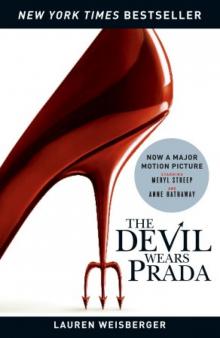 The Devil Wears Prada
The Devil Wears Prada The Singles Game
The Singles Game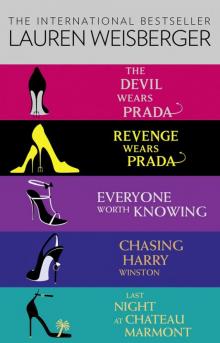 Lauren Weisberger 5-Book Collection
Lauren Weisberger 5-Book Collection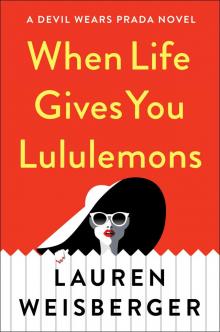 When Life Gives You Lululemons
When Life Gives You Lululemons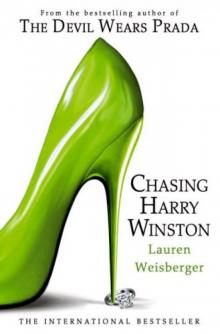 Chasing Harry Winston
Chasing Harry Winston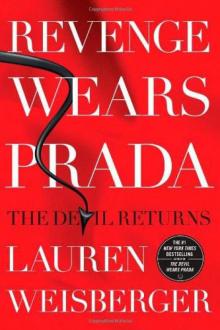 Revenge Wears Prada: The Devil Returns
Revenge Wears Prada: The Devil Returns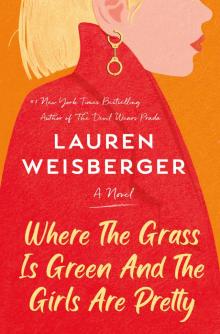 Where the Grass Is Green and the Girls Are Pretty
Where the Grass Is Green and the Girls Are Pretty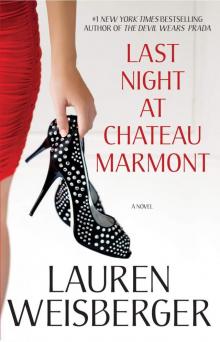 Last Night at Chateau Marmont
Last Night at Chateau Marmont